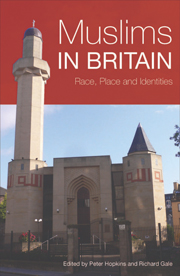Book contents
- Frontmatter
- Contents
- Acknowledgements
- List of contributors
- List of tables
- List of figures
- 1 Introduction: Muslims in Britain – race, place and the spatiality of identities
- Section 1 Gender, place and culture
- 2 Creating home spaces: young British Muslim women's identity and conceptualisations of home
- 3 ‘You seem very westernised to me’: place, identity and othering of Muslim workers in the UK labour market
- 4 Rethinking the identities of young British Pakistani Muslim women: educational experiences and aspirations
- 5 Race, ‘face’ and masculinity: the identities and local geographies of Muslim boys
- Section 2 Landscapes, communities and networks
- Section 3 Religion, race and difference
- Afterword
- Index
4 - Rethinking the identities of young British Pakistani Muslim women: educational experiences and aspirations
from Section 1 - Gender, place and culture
Published online by Cambridge University Press: 05 August 2013
- Frontmatter
- Contents
- Acknowledgements
- List of contributors
- List of tables
- List of figures
- 1 Introduction: Muslims in Britain – race, place and the spatiality of identities
- Section 1 Gender, place and culture
- 2 Creating home spaces: young British Muslim women's identity and conceptualisations of home
- 3 ‘You seem very westernised to me’: place, identity and othering of Muslim workers in the UK labour market
- 4 Rethinking the identities of young British Pakistani Muslim women: educational experiences and aspirations
- 5 Race, ‘face’ and masculinity: the identities and local geographies of Muslim boys
- Section 2 Landscapes, communities and networks
- Section 3 Religion, race and difference
- Afterword
- Index
Summary
Introduction
Young British Muslim women remain a topic for unrelenting public and media debate in the UK. The debates sparked by a newspaper article by cabinet minister Jack Straw about the wearing of the niqab are testament to the critical focus upon gender and equality within a broader sphere of public debate about the ‘integration’ of Muslims in Britain. Yet all too often in these debates ‘Muslim women’ remain a discursive category framed by the overdetermined signifier of the veil (Dwyer 1999b). Our starting point in this chapter is that a discussion of the experiences of young British Pakistani Muslim women must distinguish between ‘Muslim woman as a category of discourse and Muslim women as concrete historical subjects with diverse social and personal biographies and social orientations’ (Brah 1993: 443). We explore this diversity by focusing specifically on the topic of the education and career aspirations of a group of young British Pakistani Muslim women interviewed in Slough in 2004 as part of a wider project on the educational experiences of young British Pakistanis. Our analysis responds to current debates about the increased representation of young Muslim women in further and higher education and the workplace (Dale et al. 2002a and b; Ahmad 2001; Ahmad et al. 2003; EOC 2007). We focus on the contexts within which educational experiences and aspirations are negotiated, emphasising that gender, ethnicity, class, religion and racism interrelate as ‘contingent relationships with multiple determinations’ (Brah 1993: 443).
- Type
- Chapter
- Information
- Muslims in BritainRace, Place and Identities, pp. 55 - 73Publisher: Edinburgh University PressPrint publication year: 2009



